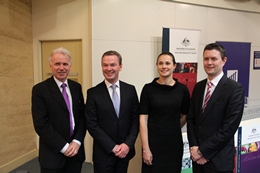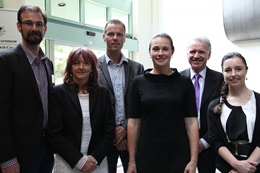08 November 2013
 The University of South Australia has won support for a range of exciting new research projects and infrastructure across health, business, artificial intelligence, environment, nanotechnology, soil science and psychology from the Australian Research Council (ARC).
The University of South Australia has won support for a range of exciting new research projects and infrastructure across health, business, artificial intelligence, environment, nanotechnology, soil science and psychology from the Australian Research Council (ARC).
Nine new UniSA research projects, with a value of over $4m were announced today by Federal Higher Education Minister Christopher Pyne at an event at UniSA’s Magill campus.
Minister Pyne was joined at the event by UniSA research fellow Dr Erica Donner, who secured $754,320 funding for health focused nanotechnology research under the ARC’s Future Fellowships scheme.
Dr Donner outlined her research project which examines whether mass commercialisation of silver-based nanotechnology is undermining its biomedical antibacterial potential.
Other successful UniSA projects announced today include:
Associate Professor Natasha Harvey received $872,240 in Future Fellowship funding for a genetics project looking at lymphatic vessel development. Lymphatic vessels are a vital but often overlooked component of the cardiovascular system and defects in the growth and development of lymphatic vessels result in disorders including lymphedema, obesity, inflammatory diseases and cancer.
Dr Sarah Wheeler, along with Dr Adam Loch and Prof Henning Bjornlund, will use a $172,000 Discovery project grant to investigate how water scarcity and market interventions have affected the Murray Darling Basin, providing invaluable policy guidance for future water management. The project has links with universities in Canada and the UK.
Professor Carol Kulik will use a $320,000 Discovery grant to investigate negotiation in the workplace, particularly for women – whose efforts to negotiate violate gender stereotypes and evoke backlash. The project, which also involves the University of Melbourne, will help employees to decide when and where to negotiate, and enable managers to design workplaces that sustain gender equality.
Professor Maureen Dollard, along with Prof Tony Winefield, received $348,000 Discovery funding to investigate the significance of psychosocial safety climate, health, and happiness for productivity. The project has links with the University of Mainz in Germany as well as the University of Adelaide.
Professor Nanthi Bolan received $383,000 Discovery funding for a soil science project titled ‘Carbon conundrum: functional characterisation of organic matter-clay mineral interactions in relation to carbon sequestration’. He will work with the University of Delaware in the United States and the National Institute for Agricultural Research on the project.
Professor Jiuyong Li, along with Dr Lin Liu, Dr Zeng Hua Lu and Prof Gregory Goodall of IMVS, received $270,000 Discovery funding for research into developing fast and scalable data mining methods for identifying causal relationships in large data.
Professor Magnus Nyden, along with Profs Nico Voelcker, Enzo Lombi, Bill Skinner and Thomas Nann, received $700,000 funding for super high resolution correlative microscopy equipment which will provide new research capability for bioengineering, clean energy, mineral processing and environmental sciences.
Professor Andrea Gerson, along with Dr Drew Evans, Assoc Prof Peter Murphy, Prof Roger Smart and Assoc Prof Dusan Losic, won $375,000 for microdiffraction capabilities, which will allow minerals analyses, corrosion analyses and research into materials, polymers and thin films.
 UniSA Vice Chancellor Professor David Lloyd said he was delighted for the researchers who had been successful in securing support for their projects in an environment where the competition for research dollars was increasingly strong.
UniSA Vice Chancellor Professor David Lloyd said he was delighted for the researchers who had been successful in securing support for their projects in an environment where the competition for research dollars was increasingly strong.
“Research being undertaken at UniSA is done with a growing aspiration to make a difference on the world stage – to improve lives, make breakthroughs and build stronger communities,” Prof Lloyd said.
“The fact many of the successful UniSA projects have national and international collaborations is significant because increasingly research should have global applications and be built on enterprising and creative partnerships.”
“Funding announcements like today’s event are awaited by researchers throughout Australia with great anticipation and no small amount of anxiety. Research today is more competitive than ever, successes of this kind should be celebrated.”
Speaking at the UniSA Magill event, Minister Pyne – noting Australia’s strong record in international rankings – said Australia punched above its weight in producing world-class research.
“If Australia is to continue to produce ground-breaking research outcomes, then a strong investment in research is needed,” Mr Pyne said.
For full ARC grants details go to www.arc.gov.au/media/major_announce.htm
Media contact: Kelly Stone office 8302 0963 mobile 0417 861 832 email Kelly.stone@unisa.edu.au




